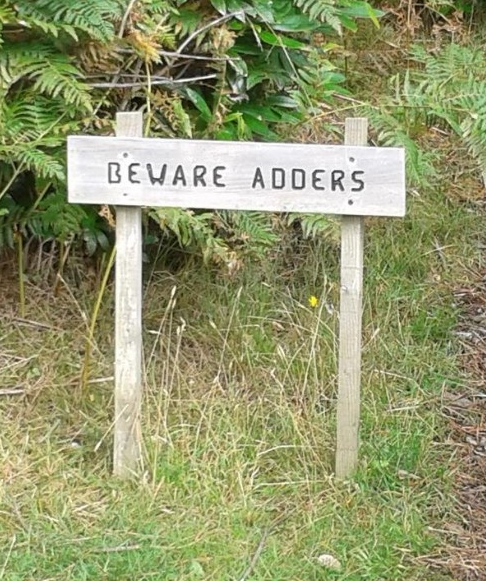Anne Watson
Keith Wilson’s article in the June issue of Forty-Three made me chuckle. For a couple of years my laptop has opened to a photograph of this sign ‘Beware Adders’ found on the Isle of Mull next to a remote honesty shop.

I use this because I am someone who thinks mathematically, and adding is a very unimaginative way of proceeding in a calculation and might not get you very far, or even be the sensible thing to do. It is a human tendency because even very young infants seem to understand the ideas of ‘more’, and counting on fingers is physically easier than subtracting on fingers. Think about how we recite the words for numbers: we encourage children to recite them in ascending order. Rarely, apart from ‘countdowns’, do we recite them backwards. Keith contrasts adding with reducing: reducing clutter; reducing overload; simplifying; maybe reducing consumption; identifying what can be removed – all valuable perspectives.
But as a mathematician I contrast adding with multiplying, which has more power than adding – power that can be beneficial or can be dangerous. Yes, multiplying can lead to rapid exponential growth that can be worrying, but it can also spread good things faster. Thinking about multiplying can give a better understanding of what is going right or what is going wrong. In Danny Dorling’s book Slowdown he looks at some statistics that we all worry about: more pollution, more disease, more population, more weapons. But he then turns us away from these worrying ‘mores’ to look at how fast they are growing, and sees some hopeful signs of slowdown by looking at the hidden multiplication rates. Thinking about multiplying can help us be more effective; if I spread a good message to five people, and they each spread it to another five, we have multiplication to multitudes. If instead we only tell one person, and they only tell one person, it will take a long time to reach multitudes, even if the chain is unbroken. In the Bible the number ‘seven’ is often used to indicate fullness or completion. Jesus is famously reported as thinking of goodness in a multiplicative way, endlessly in Matthew 18 verses 21, 22. Peter asks how many times he should forgive someone who repeatedly ‘sins’ against him – seven times maybe? In the King James version Jesus says “Until seventy times seven.”
These are some of the reasons why I kept the ‘beware adders’ sign, but I liked Keith’s slightly different point. He gave me a vivid image of how I might say ‘… and another thing’ to someone, while knowing from my own experience that the ‘another thing’ is likely to obscure whatever has gone before.
| Previous Article | Next Article |
Back to July 2022 Newsletter Main Page
Forty-Three Newsletter • Number 519 • July 2022
Oxford Friends Meeting
43 St Giles, Oxford OX1 3LW
Copyright 2022, Oxford Quakers
